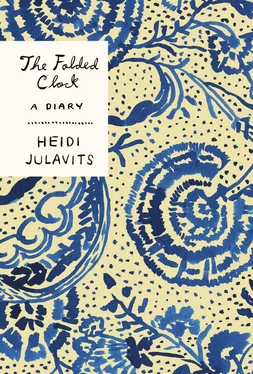He fetched from the shelves a novel that appears in many houses around here because the novel is about this town, and the writer wrote about real people and changed their names, and so everyone bought the novel to see if and how they’d been portrayed. He read the first sentence aloud. “All places where the French settled early have corruption at their heart, a kind of soft, rotten glow, like the phosphorescence of decaying wood, that is oddly attractive.”
This proved everything and nothing, and led to a conversation about la tendresse , which the artist refused to define, save to say, “If you don’t know about la tendresse , you’ll understand nothing about nineteenth-century French literature.” Another friend explained la tendresse as the sexual education of French daughters by French mothers. Education of actual sexual techniques? we asked. Or just wiles? What class of French women inculcated their daughters via la tendresse ? And what did this say about the man we knew who’d married and then divorced a millionaire and built a boat named Tendress ?
This discussion, such as it was, dovetailed with a tendresse -related conversation I’d had two nights previous. In August, in Maine, it can sometimes seem that everyone everywhere is having the same conversation between the hours of five and eight p.m. The summer bleeds into an extended talking twilight. I was discussing with two women how best to raise a girl so that she won’t become anorexic and won’t approach sex guiltily, because many of us had mothers who came of age during an era when to have casual sex with a guy was thereby to inspire his disrespect, and to subsequently be seen as a woman of low morals, i.e., unmarriageable and worthy only of fucking. I admitted to telling my eight-year-old daughter, who has a great body but is no waif, that she shouldn’t wish to be really skinny, because in my experience (I told her) once you start dating, you’ll get a lot of action if you’ve got meat on your bones. I didn’t say “if you look fuckable,” but that’s what I meant. I was insecure about my non-waify body when I was a teenager, but I had a boyfriend who guaranteed me that my body was “fuckable,” and this seemed a decent runner-up distinction if I couldn’t look like a model. I then emphasized to my daughter that her self-worth should have nothing to do with what other people thought (thereby contradicting myself); that she had to believe her body to be fuckable, i.e., if only she wanted to fuck it, that would be ideal, and that would make other people, girls or boys or whatever, want to fuck it more. Again I communicated all of this using none of these words. I admitted to my friends that maybe it was totally screwed up to mention this stuff to my daughter, and that I basically really didn’t know how to talk about it at all. But now this conversation with my daughter could be viewed, more nobly, as my attempt at la tendresse Américaine . Set a good example. Want to fuck yourself so that others want to fuck you too.
Today I wore a coat I haven’t worn for years. My husband and I were headed downtown on the subway. I said to him, “I wonder what’s in the pockets.” I use my clothing as storage for important and unimportant paper scraps I might paste into a book if I were more organized. The contents of my pockets are like the diary I have, until recently, failed to keep. In pockets I have found movie stubs, plane tickets, to-do lists, e-mail addresses written on grocery receipts, business cards from people I have no memory of meeting, reminders that I used to have far more money in my savings account than I currently do, jotted-down directions (what was at 457 7th Avenue? Who was in Suite 23?). According to my pockets, I’ve been all over this city. I could mark these destinations on a map using pushpins, showing the shape of my travels over the past twenty years. These are my hunting grounds, though I have no memory, now, of what I was hunting.
Sometimes there is money.
So today I said to my husband, “I wonder what’s in the pockets,” thinking I would pull out the usual handful of oblique data points. Instead I found a folded piece of 8½ x 11 paper. I assumed it was the Robert Frost poem I’d read at our friend’s daughter’s bat mitzvah. (I encounter this poem every two years or so. I keep it in a spring coat; I never can remember which one.) I was surprised to unfold the paper and discover our wedding vows.
“It’s our wedding vows,” I said to my husband. We’d been married in our backyard in Maine, and, yes, I recalled, when it had grown colder that afternoon, I’d put on this coat. This was now ten years ago.
I tried to read the vows but found I couldn’t. I felt embarrassed, maybe because we were on the subway and in close proximity to many strangers, but then again we’d gotten married in front of strangers, people we’d literally just met when we’d moved, a month earlier, to Maine. We invited the strangers to our wedding, but I did not — out of shame, because I’d been married before and not successfully — invite my own family. I was trying to make a very small deal of this wedding. I thought I was being so sensitive by failing to include them in this really (I told myself) quite insignificant event. It wasn’t worth the plane fare, I reasoned, plus I figured they’d wish to be spared the shame of witnessing their daughter or sister promise to unfalteringly love yet another man. Then the morning of the ceremony I realized how much this wedding meant to me, and how much I needed my family there, and how insanely thoughtless and stupid it was to think I could get married, especially to this man, without them. I wept on the phone to my mother while the wind blew and the sun shone and the yard was readied for a ceremony that she would, because I’d wished to spare all of our feelings, miss.
In the subway car I handed the vows to my husband. He tried to read them. He also grew uncomfortable. Why was this? We’d been married by an Internet-anointed, ex-fighter-pilot-turned-mussel-farmer; it had been up to us to provide the ceremony’s entire script. So maybe we were made uneasy by what we’d written because we are writers. What writer can look at something he or she wrote ten years ago and not feel that back then he or she knew basically nothing about language or life? Or maybe my husband, like me, experienced a little bit of personal mortification regarding “our affairs.” Though we’re both highly capable and responsible people in other areas (job, family), we’re unable to file our taxes without an extension. We’re unable to keep track of our Social Security cards or birth certificates or car registrations or any of the official documentation one is called upon, with erratic infrequency, to produce. When we recently needed our marriage certificate to prove my spousehood to the Germans, we were so uncertain of its location that we began to doubt we’d ever owned a copy. Then my husband stumbled upon it in a cabinet used to store lightbulbs and chafing dishes. He put it in a more sensible place and immediately forgot where that was.
Another possible explanation for our discomfort: my husband and I, on this day, were going on our first date together in months. We’ve rarely been in the same city for the last year and a half. I recently met him on the street to exchange the kids when I was returning from a trip and he was leaving on one, and the time window was so narrow that we had to rendezvous on a corner, and hug hello and good-bye, and he took his suitcase and got in my cab, and I took my suitcase and wheeled it home with our children. So maybe it was because we were just getting to know each other again after a few trying years of what my husband called “corporation co-management.” It was a bit like having amnesia and being introduced to a total stranger and told, “You’re in love with this person. You’ve been in love with them your whole life!” It’s not that we weren’t in love, but we’d grown shy around each other. I think we were slightly embarrassed by the baldness of the love proclamations we’d written in our vows.
Читать дальше












